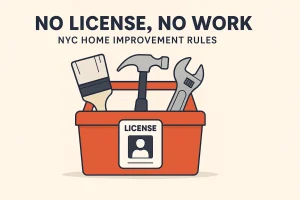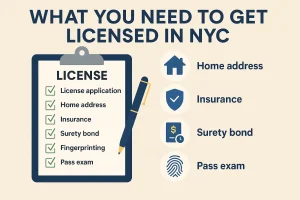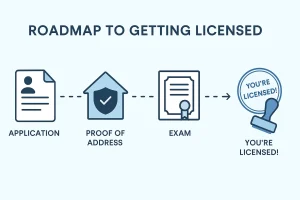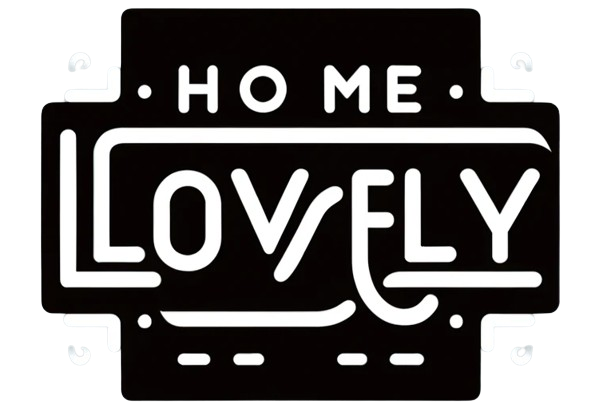Home renovations are stressful enough without having to worry if your contractor is actually legit. You’re investing your hard-earned money, your time, and your trust into improving your space. The last thing you want is to find out halfway through the project that the person running the show wasn’t even properly licensed.
It happens more often than you think. Sometimes the price sounds too good to be true — maybe they promise a “friend’s discount” or tell you they can cut corners on materials. But what you’re really risking is far worse: shoddy workmanship, unsafe installations, and legal headaches if things fall apart.
Here’s what most homeowners don’t realize — that Home Improvement Contractor License isn’t just some random piece of paperwork. It’s your safety net. In most states, licensed contractors have to carry liability insurance, pass trade exams, and often secure bonds that hold them accountable. Some even go through background checks. All of that protects you if the unexpected happens.
And in places like New York, working without a license isn’t just frowned upon — it’s illegal. Hiring an unlicensed contractor can strip them of their right to get paid and leave you with little to no legal protection if things go sideways. Some states even have homeowner protection funds that only apply when you hire licensed professionals.
So, whether you’re remodeling your bathroom, upgrading your kitchen, building a new deck, or doing roof repairs — your contractor likely needs to be licensed. Even smaller projects like fencing or storm window installation can require it, depending on where you live.
If you’re a contractor reading this — skipping the license step might feel like a shortcut, but it’s the fastest way to lose your paycheck, face fines, or wind up with legal trouble. And yes, that applies to subcontractors too — no one’s above the rules.
So whether you’re a homeowner or a contractor, one thing’s clear: playing by the rules protects everyone involved.
What is a Home Improvement Contractor License?

In New York City, the Home Improvement Business Law defines a contractor as anyone who “owns, operates, maintains, conducts, controls, or transacts a home improvement business” and “undertakes or offers to undertake or agrees to perform any home improvement or solicits any contract for that work,” whether they’re the main contractor or a subcontractor.
Simply put, if someone offers to repair, remodel, or make improvements to your home or apartment—and they’re charging for it—they’re considered a contractor. This applies whether you’re a homeowner, renter, or living in a co-op or condo.
A contractor can be a solo worker, a partnership, a corporation, or any business entity. Under New York City law, anyone who advertises, sells, negotiates, or performs home improvement work where the total cost (labor, materials, etc.) is over $200 must have a valid Home Improvement Contractor (HIC) license from the Department of Consumer Affairs.
You might also want to understand the difference between a home improvement contractor and a general contractor!
Why is a Home Improvement Contractor License Required in NYC?
In New York City, home improvement projects are happening all the time — from small repairs to full-on renovations. But there’s one important rule homeowners and contractors can’t overlook: if you’re getting paid to work on someone’s home, you need to be licensed.
Whether you’re remodeling a kitchen, repairing a roof, building a patio, or even installing storm windows — if the job involves improving a private home, apartment, condo, or co-op, a Home Improvement Contractor License is required. It doesn’t matter if you’re working solo, with a team, or as part of a bigger company — the law applies to everyone.
Why Does the License Matter?
The license isn’t just a formality — it protects homeowners and ensures contractors are qualified to do the job. If you skip the license, you risk more than just fines. Working without a license means:
-
You can’t legally enforce your contract or demand payment
-
You lose the right to sue if the homeowner refuses to pay
-
You could face serious fines or legal action
In NYC, unlicensed work is considered a Class A misdemeanor. That can mean hefty fines, daily penalties, and even losing your vehicle if it’s tied to the unlicensed work.
Subcontractors need to be licensed too. Even if you’re hired by a general contractor, you still need your own license to work legally. Employees working directly for a contractor are covered, but independent subcontractors aren’t. Without a license, you also lose the right to file a lien if you don’t get paid — so there’s really no protection for you.
NYC Home Improvement Contractor License Requirements
If you’re planning to do home improvement work in New York City; you’ll need a Home Improvement Contractor License. This applies to anyone working on residential buildings, apartments, co-ops, condos, or the land around them.

What You Need to Get Your License
To apply for your Home Improvement Contractor License, here’s a quick rundown of the essentials:
-
A completed license application
-
Proof of your business address and your home address
-
A Sales Tax ID or confirmation number
-
Workers’ Compensation Insurance, or proof you’re exempt
-
EPA certification for safe lead practices—or a signed form stating it’s not required for your work
-
Either a $200 fee to enroll in the city’s Trust Fund or a $20,000 Surety Bond
-
A signed agreement confirming your contracts meet city requirements
-
Passing the Home Improvement Exam (30 questions; you need at least 21 correct)
-
Fingerprinting for background checks
-
The license fee
Submitting your application doesn’t mean your license is automatically approved—everything has to be complete.
Other Permits You May Need
-
You’ll need a permit from the NYC Department of Transportation.
-
Major home improvements often require permits from the Department of Buildings.
-
If you’re hauling construction waste, you’ll need to register with the NYC Business Integrity Commission.
It’s always smart to double-check requirements based on the type of work you’re doing.
Depending on your business structure (sole proprietor, partnership, corporation), you’ll need the right business certificates. Even if you’re using a different name for your business, you must register it properly with the state.
Bonding and Insurance — What You Actually Need as an NYC Contractor
If you’re thinking about getting your Home Improvement Contractor License in New York City, there are two things you can’t skip: a surety bond and insurance. Yeah, it’s more paperwork, but trust me — this isn’t just about ticking boxes. They protect you and your clients when life throws curveballs (and it will).
Surety Bond. What’s that even mean?
The bond is basically your promise in writing — backed by money — that you’ll finish the job and do it right. If you mess up, walk away, or things go south, your customer isn’t left empty-handed. They can file a claim to help cover the damage or unfinished work.
The city requires most contractors to carry a $20,000 bond. In case of a bigger business; you might need more. How much does it cost? Usually around $200 to $500 a year, depending on your credit history. You get it through a licensed bond company, kind of like car insurance.
General Liability Insurance
This is your safety net for when accidents happen (because they do happen). Say a window breaks, someone gets hurt on-site, or property gets damaged — your insurance covers it. Most folks carry at least $1 million in coverage, but some jobs or companies may need more.
Without bonding and insurance, your license application gets denied. Even worse? If you try to work without them, you’re leaving yourself wide open to lawsuits, fines, or worse. It’s not worth the gamble.
Think of this stuff as your backup plan. It keeps your business legit, protects your wallet, and gives your clients peace of mind that you’re the real deal.
How to Get Your Home Improvement Contractor License in NYC
If you’re ready to work as a licensed home improvement contractor in New York City, there’s a process to follow. It’s got a few steps!

Step 1: Fill Out Your Application
First, you’ll need to complete your application. This is where you give them all the basics like your company name, your business address, and your Tax ID Number (EIN). You’ll also need your New York Sales Tax Number or your confirmation number showing you’ve applied for it. Don’t forget to note what type of business you have — like Sole Proprietor, LLC, or Corporation. Once you’ve got all that ready, you can either go in person to one of the NYC offices by appointment, or you can do the whole thing online. Online is usually easier, but both options are there for you.
Step 2: Show Proof You’re Set Up for Sales Tax
The city needs to know you’re properly registered to collect sales tax — fair enough. If you already have a Sales Tax ID, perfect. If not, you’ll have to apply for one on the State’s Business Express site and bring that confirmation number with you. Basically, they want to make sure your paperwork is solid before you start working jobs.
Step 3: Prove Your Business Address
They’ll want to see where your business is based. You can show this with a utility bill, a lease, mortgage statement, insurance papers, or even official mail from a government agency — as long as it clearly shows your business address. It has to be in your company’s name or at least one person listed on the application.
Step 4: Prove Where You Live
Now, they also want proof of your home address. Same deal as the business address — a recent utility bill, lease, mortgage bill, or official government letter works. If you live with someone else, like a family member or roommate, just get a letter from the homeowner or leaseholder saying you live there, along with one of those proof documents.
Step 5: Show Your Workers’ Comp Coverage
If you’ve got employees, you need to have workers’ compensation insurance. It’s there to protect your team if anyone gets hurt on the job. You can get this through a licensed insurance company or the New York State Insurance Fund. If you don’t have employees and qualify for an exemption, you’ll need to show that paperwork instead. Either way, they won’t approve your license without this step.
Step 6: Sort Out Your EPA Certification
Depending on the kind of work you’ll be doing, you might need EPA certification, especially if you’re working with lead paint or older homes. You’ll either submit your Renovation and Lead Abatement certificates or sign a form saying those certifications aren’t required for your work. The city just wants to be sure contractors working around lead know how to handle it safely.
Step 7: Decide Between Trust Fund or Bond
To protect homeowners, the city requires contractors to either join the Home Improvement Trust Fund (which costs $200) or buy a $20,000 surety bond. The bond acts as a safety net for customers if you don’t finish a job or run into issues. If you go with the bond option, you’ll need to show proof it’s been fully paid.
Step 8: Sign the Compliance Agreement
Every licensed contractor has to sign a Contractual Compliance Agreement. This basically says you’ll follow the city’s rules when writing up contracts with your customers. It covers things like clear start and end dates, payment schedules, warranties, and making sure everything’s written in simple words so your clients know exactly what they’re getting.
Step 9: Take the Contractor Exam
After your paperwork is submitted and approved, you’ll need to pass the Home Improvement Contractor Exam. It’s a 30-question, multiple-choice test, and you’ll need to get at least 21 right to pass. Only one key person from your company needs to take it — like the owner, a partner, or someone with 10% or more ownership. If you don’t pass the first time, no worries, you can retake it after paying the fee again.
Step 10: Authorize Someone to Apply for You (Optional)
If you’re not handling the application yourself and someone else is stepping in to help, you’ll need to fill out a Granting Authority to Act form. That just gives them official permission to handle your application on your behalf.
Step 11: Get Fingerprinted
This is a standard part of the process for everyone involved in the business — owners, directors, partners, shareholders with more than 10% ownership, etc. You’ll schedule your fingerprinting appointment and bring your application number with you. It’s quick, usually done in about 15 minutes, but absolutely required.
Step 12: Pay the License Fee
Your license will always expire on February 28th of odd-numbered years. How much you pay depends on when you apply, but expect around $100 for a license valid up to the next odd-numbered February. You can pay in person or online with a check, money order, or credit card — just know there’s a small extra fee if you’re paying by card.
Fees and Costs Associated with a NYC Home Improvement Contractor License
Let’s talk dollars and cents—because getting your Home Improvement Contractor License in NYC isn’t just about paperwork. There are a few costs you’ll need to plan for upfront. Thankfully, most of the fees are pretty straightforward, and I’ll walk you through them right here, no legal jargon, just plain talk.
1. License Application Fee — $50
First off, there’s a $50 fee when you apply for your Home Improvement Contractor License. Whether you’re applying for the first time or renewing an existing license, the fee stays the same. Simple, right? You’ll pay this when you submit your paperwork, either online or in person.
2. Home Improvement Exam Fee — $50
If this is your first time applying, you’ll also need to take the Home Improvement Contractor Exam. The test costs $50. It’s a multiple-choice exam with 30 questions, and you’ll need at least 21 correct to pass. If you don’t pass on the first try, no worries—you can retake it, but you’ll need to pay the exam fee again each time.
3. DCWP Trust Fund or Surety Bond
Now, this one’s a bit of a choice. The city requires some form of protection for your customers in case something goes wrong on the job. You can either:
-
Pay $200 to join the NYC Home Improvement Contractor Trust Fund
OR -
Provide a $20,000 Surety Bond, which usually costs around $100 depending on the provider
The Trust Fund fee is a one-time thing when you apply, and the bond option protects homeowners from contractor issues like unfinished work or unpaid bills.
4. Fingerprinting Fee
Anyone involved in the ownership or management of your business (owners, directors, partners, etc.) needs to get fingerprinted through IdentoGO. The fee varies slightly but expect around $101.75 for fingerprinting services. It’s quick and painless—just part of the city’s background check process.
5. Optional Costs to Consider
While not required for your license itself, many clients—especially in NYC—expect you to carry additional insurance like:
-
General Liability Insurance
-
Additional Workers’ Compensation Coverage (if you have employees)
It’s not enforced by the licensing department, but being insured shows your clients you’re a serious, trustworthy contractor—and let’s be honest, it makes it easier to land jobs.
Here’s a quick example of what your first-time license process might cost:
| Expense | Estimated Cost |
|---|---|
| License Application Fee | $50 |
| Home Improvement Exam Fee | $50 |
| DCWP Trust Fund (or Surety Bond) | $200 (or ~$100 for bond) |
| Fingerprinting | ~$101.75 |
| Total Estimated Cost | Around $400-$500 |
Keep in mind—this is for first-time applicants. Renewals are typically simpler and cost less (mainly the $50 renewal fee).
Penalties for Operating Without a Contractor License in NYC
Working as a contractor in NYC without the proper license is just asking for trouble. Not only is it illegal, but the city doesn’t exactly go easy on folks who try to skip the system. The fines? They’ve gotten steeper, and trust me, they can drain your wallet fast.
Here’s what you need to know:
Working Without a Permit on a House or Small Residential Job
If you’re doing work on a one- or two-family home without the required permit, you’re looking at some serious fines. The city will hit you with a penalty that’s six times the amount you were supposed to pay for the permit. And it doesn’t stop there—the minimum fine starts at $600, and if they really crack down, you could be paying up to $10,000. That’s money you could’ve put toward your business—or your next vacation.
Working Without a Permit on Bigger Buildings or Commercial Sites
Now, if you’re working on something larger—say, an apartment building, office space, or any job that’s not a small house—the fines get even nastier. In these cases, the city charges twenty-one times the amount of the permit fee you skipped. Yep, you read that right. And the fines? They start at a whopping $6,000, with a max penalty of $15,000.
Long story short—trying to sneak by without permits isn’t worth it.
Where (and How) You Pay the Fines
If you do get slapped with one of these violations, you’ll have to pay the penalty at the Borough Office where your violation notice came from. The city makes it easy to pay—credit cards, certified bank checks, or money orders are all accepted. But honestly? The easier option is just following the rules from the start.
Heads Up on Penalty Waivers
Sometimes there are options to request a waiver or reduction of these penalties, but that process is handled separately. The city usually posts notices about those opportunities when they become available, so keep an eye out if you find yourself in that situation.
NYC doesn’t mess around when it comes to unlicensed contracting work. The process to get licensed takes a little time, sure—but compared to risking $10,000 or $15,000 in penalties? It’s totally worth it.
Common Mistakes to Avoid When Applying for a Home Improvement Contractor License
Navigating the application process can be tricky, and many contractors make mistakes that delay or prevent approval.
Avoid These Pitfalls:
- Incomplete Application: Double-check your forms and ensure every required document is submitted.
- Wrong Bond or Insurance: Make sure you have the correct surety bond and insurance in place.
- Ignoring Background Check Requirements: If there are issues in your background, address them before applying to avoid delays.
- Delaying Renewals: Don’t wait until the last minute to renew your license. NYC can suspend or revoke licenses if renewals are late.
Being thorough during the application process can save you time and headaches down the road.
Get Your NYC Home Improvement Contractor License!
Securing a home improvement contractor license in NYC might seem overwhelming at first, but with the right preparation, it’s a straightforward process.
The license not only helps you comply with local laws, but it also protects your business and your clients. By ensuring you meet all the requirements, from bonding and insurance to background checks and documentation, you’re positioning your business for long-term success.
FAQs
How do I actually find a trustworthy contractor?
Start by talking to people you know — friends, family, neighbors — anyone who’s recently had similar work done. Personal recommendations are gold. Once you have a few names, get at least three written estimates for the same project. That way, you’re comparing the same work, materials, and timelines — no surprises.
Always double-check their license. Just because they have a flashy ad or a nice truck doesn’t mean they’re properly registered. You can call your local consumer protection office or check online to confirm. While you’re at it, peek at their record with the Better Business Bureau — you’ll see if they’ve had complaints or unresolved issues.
One more tip? Ask their suppliers if they pay their bills on time. If they’re behind on payments, that could mean trouble for your project down the line. And always check with your local building department about permits — any contractor worth hiring knows when permits are required.
What kind of insurance should my contractor have?
Your contractor should have personal liability, property damage, and workers’ compensation insurance — no exceptions. Ask for proof before work begins. This protects you if someone gets hurt on your property or if damage happens during the project. You can also check with your own insurance company to make sure you’re covered during the job.
Can I trust contractors who advertise in the Yellow Pages or online?
Not automatically. Ads might look professional, but they don’t guarantee the contractor is licensed, experienced, or reputable. Always verify their license, check reviews, and ask around before hiring. The best contractors earn their reputation through good work — not flashy ads.
How do I properly check a contractor’s references?
Talking to a contractor’s past clients is one of the smartest things you can do. It gives you real insight into how they actually work — not just what they promise. When you speak to their references, ask if you can see the finished project in person. That way, you’re not just hearing about the work, you’re seeing the quality for yourself.
Also, ask if the person was happy with the project overall — did the contractor stay on schedule? Did they keep them updated along the way? You’ll also want to know if there were surprise costs and how those were handled. Little things matter too — were the workers on time? Did they clean up properly after finishing? The most important question? Would they hire that contractor again.
Does it really matter if the contractor has a license?
Yes, it matters. A lot. In places like D.C., for example, it’s actually illegal for a contractor to accept payment for home improvement work if they don’t have a license. Even if they get a license later, that doesn’t make it okay. Contractors can’t work under someone else’s license either — that’s a big no-go. So always ask to see their license, and double-check that it’s valid and up to date before you agree to anything.
Is there anything the contractor has to do before they start working?
Absolutely. Even licensed contractors need to get the proper permits before starting your project. Permits protect both of you by making sure the work meets local safety standards. They also need to post a money bond — that’s basically a guarantee they’ll finish the job and meet the requirements. If your contractor brushes off permits, that’s a red flag — walk away.
Should I get everything in writing before the work starts?
Yes, always. A written, signed contract is your best protection. It’s tempting to shake hands and keep it casual, but if anything goes wrong, an oral agreement won’t help you much. Get it all in writing, clearly and completely, before anyone picks up a tool.



Expliciete webplatform biedt een reeks video’s voor adult entertainment.
Kies voor gegarandeerde porno hubs voor een veilige ervaring.
Feel free to surf to my website … VIAGRA FOR YOU